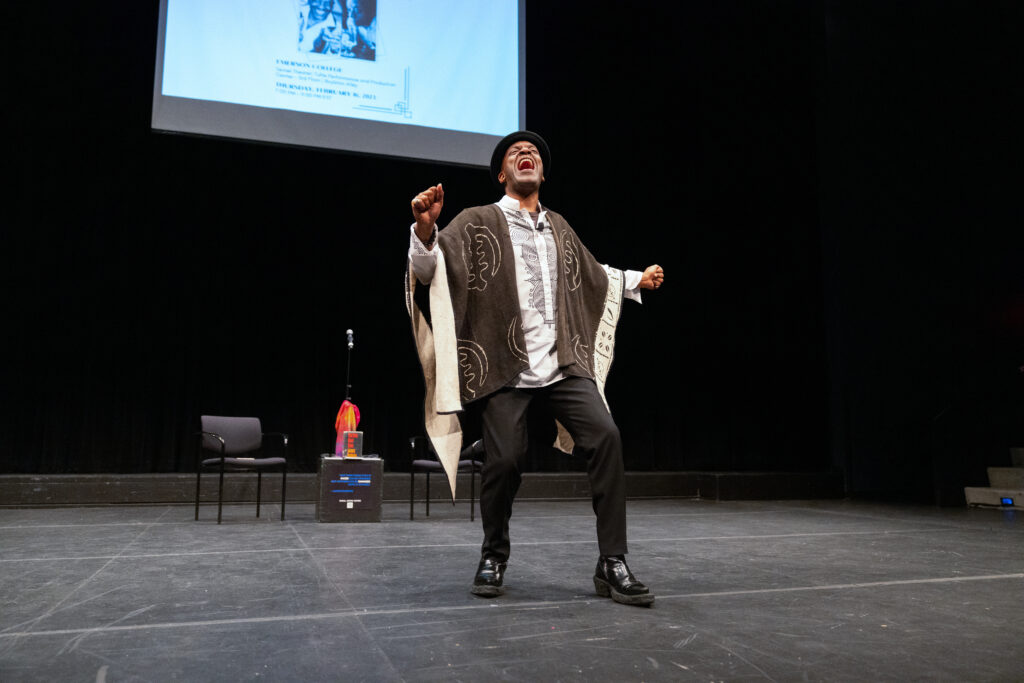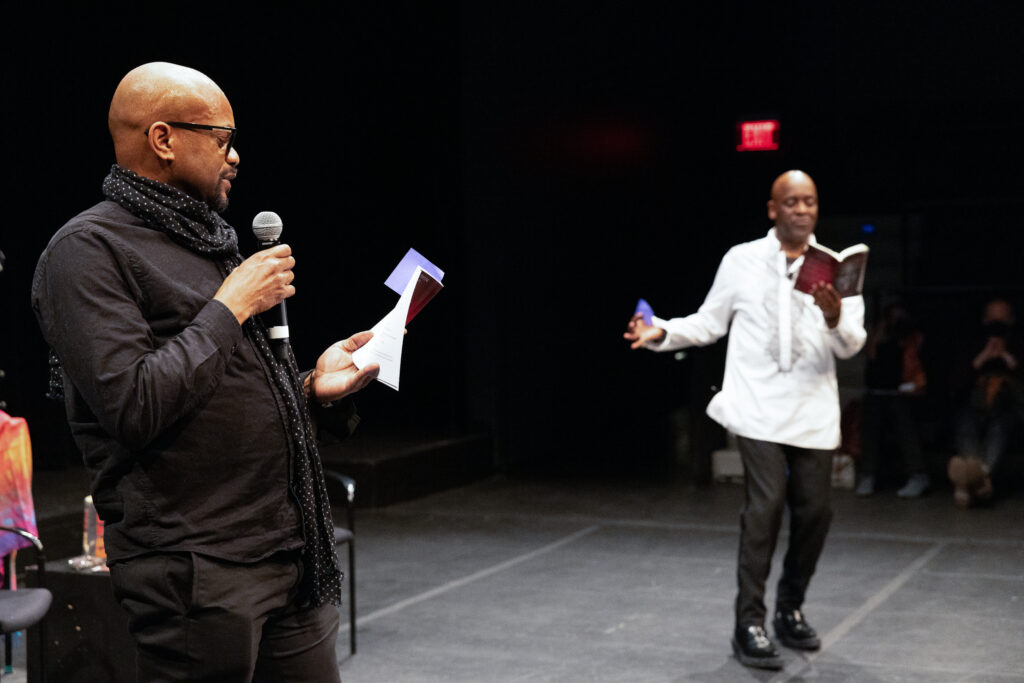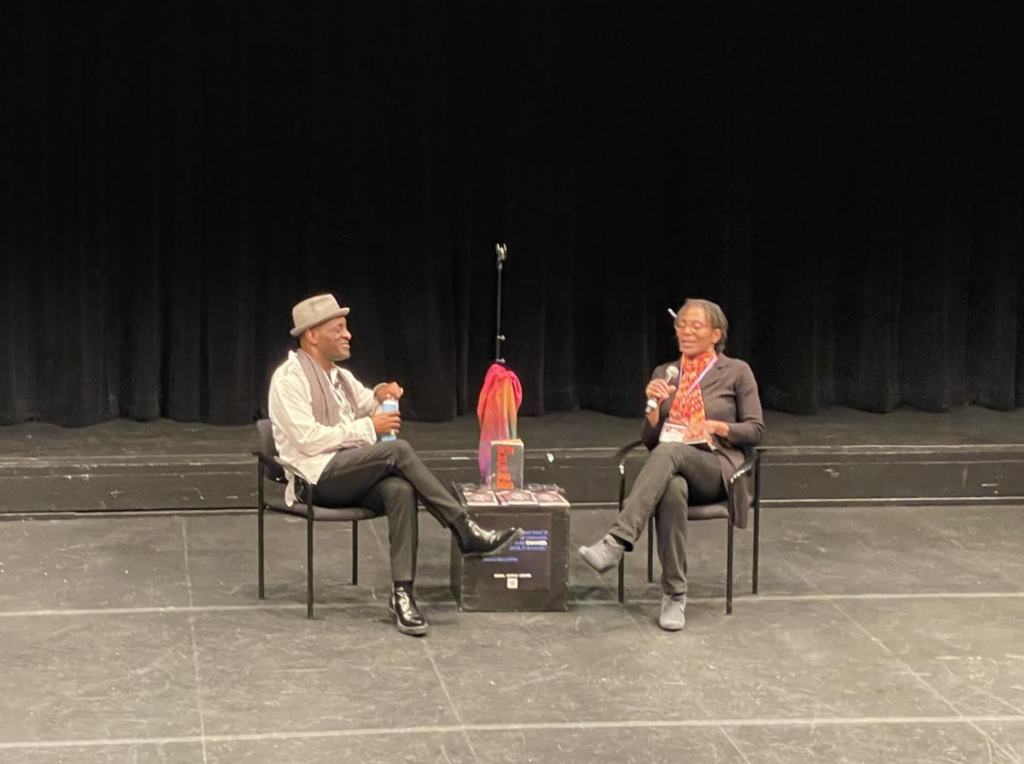Teach-In on Race: What Would Baldwin Say Today About Race Relations?

Inspired, motivated, moved, empowered, vulnerable.
Those were emotions expressed by audience members after Charles Reese asked for feedback to his theatrical reading of James Baldwin’s The Fire Next Time.
Reese’s reading was part of a Teach-in on Race event held at the Semel Theater in which he presented his interactive literary and performance salon, An Evening in History with James Baldwin. The salon pays homage to the literary salons of the Harlem Renaissance that provided an educational space for Black artists to gather and exchange ideas through art, song, and culture.
Reese is a touring actor, author, and program coordinator . The salon takes archival sources, including Baldwin’s works, the late playwright Howard Simon’s James Baldwin: A Soul on Fire, songs, poetry, and curated videos showing important moments in Black history, and uses them to inform a conversation about race relations today.
“So each time you come and see the salon, I’ll be adding different things, but the story of James Baldwin remains the same,” Reese said.
Reese’s performance focused on Baldwin’s impact on race relations through his Secret Summit of 1963 with Attorney General Robert Kennedy. Kennedy invited Baldwin, along with other Black artists Baldwin brought, including Lorraine Hansberry, Lena Horne, Harry Belafonte, and Kenneth Clark, to discuss race relations in America.

During the performance, Reese invited Tony Award nominee and audience member Forrest McClendon to join him on stage for an impromptu reading from James Baldwin: A Soul on Fire.
Following the performance, Reese and moderator Kim McLarin, professor and interim dean of graduate and professional studies, invited questions from the audience.
Reese’s Fascination with Baldwin
Reese first became interested in Baldwin as a freshman at Morehouse College, after running into the writer on the College’s Atlanta campus.
“This man looked at me and he said, ‘My, you have eyes like mine,’ and I said, ‘thank you very much’ and then I ran,” Reese said, referring to his encounter with Baldwin. “I guess that one sentence must have said something to me.”
After Reese graduated, he went to Paris with Simon in search of Baldwin. With their degrees and $40 in their pockets, they were convinced someone would take them in. As it turned out, Baldwin wasn’t in Europe in the summer of 1985. He was in America.
What Would Baldwin Say Today?
McLarin said Baldwin spoke the truth, particularly when he wrote The Fire Next Time.
“He believed that just speaking the truth would call America to its higher self. And here we are 60 years later,” McLarin said. “What would James Baldwin say today about whether speaking truthfully is sufficient?”

Reese encouraged people to pick up Baldwin’s books The Fire Next Time, Another Country, and Nobody Knows My Name because he feels that they still hold true.
“Writers can kind of chew off each other and have similar thoughts and opinions. So I think Baldwin would be saying something like Simon’s [1997] poem the ‘Cool Brother,’” Reese said. “Because we’re still dying.”
Reese’s Advice For Writers
Reese referred to Baldwin for his advice to writers and artists.
“‘You have to go the way your blood beats. If you don’t live the only life you have, you won’t live some other life, you won’t live any life at all’,” Reese said quoting Baldwin from a 1984 interview with Village Voice journalist Richard Goldstein.
“Take no one’s word for anything, including mine – but trust your experience,” Baldwin wrote in The Fire Next Time.
Reese’s Advice for Young Artists
Reese feels Baldwin was a huge supporter of young people and young artists. During the salon, Reese invited all of the audience members under the age of 25 to stand while he read an excerpt from the end of The Fire Next Time. A student asked for words of encouragement and advice for young artists at Emerson, who may feel discouraged or discredited making their voices heard.
“Find your tribe,” Reese said.
Having a tribe of like-minded people was important to Baldwin. He would gather his “tribe,” including Maya Angelou, Nina Simone, and Harry Belafonte, at his house in the south of France for what was called a “welcome table”. Baldwin also called forward his tribe to his meeting with Kennedy.
“All of these artists were in one meeting with the attorney general talking about race relations. Can you imagine?” Reese said. “Artists in the room telling the attorney general what they should do. That’s powerful.”
Reese left the audience with a charge to take home.
“If you had to go to a meeting [like Baldwin’s meeting with the attorney general] today,” Reese said. “Who would you take and what would your agenda be?”
Categories